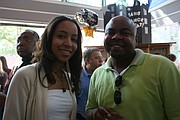AUKE BAY, Alaska (AP) - Determined to avoid a pat-down search to board her flight home, an Alaska state lawmaker took an unusual route: a roundabout four-day detour via rental car, a small plane, taxicab and a ferry.
Rep. Sharon Cissna's land-air-and-sea journey ended Thursday when the ferry arrived in Auke Bay, outside Juneau, where she was met by a small group of well-wishers and a bouquet of yellow flowers.
She said travelers are "accidentally being abused by government," and she vowed to fight for changes in how the Transportation Security Administration deals with screening passengers, especially those with special health issues.
Cissna, D-Anchorage, is a cancer survivor who has had a mastectomy. She underwent the full-body scan at Seattle's airport but was singled out for a further pat-down search, her second, she said, within three months.
She said she considers herself a law-abiding citizen but felt the need to stand up for herself. So, having vowed to never endure the pat-down procedure again and unable to board the flight, she took the rental car across the border, where she caught a small airplane from a Vancouver airport to Prince Rupert, B.C.; from there, she had a two-day ferry ride to Juneau, Alaska's capital city accessible only by air or water. A taxi ride helped to connect the trip.
"It was all kind of exciting and a little strange," she said.
Her case is from far isolated and has turned the petite 68-year-old into an unlikely hero, applauded on Facebook and the state House floor for her stand.
"I feel really proud of Sharon," House Democratic leader Beth Kerttula said. "I think she stood up for thousands of Americans who are saying, why, when a woman has had a mastectomy, does she have to go through this?"
Since new screening measures took effect last year, the American Civil Liberties Union has reported receiving more than 1,000 complaints from travelers - including breast cancer survivors - who said they endured intrusive pat-downs. Among other things, the travelers claim TSA agents patted their genitals and ran fingers through their hair or along their bras or waistbands.
At least one federal lawsuit has been filed over the pat-downs. The plaintiffs in the case, pending in the District of Columbia, include a breast cancer survivor from California and a Kentucky man that the lawsuit says was presumably singled out for a pat-down due to an enlarged testicle.
"In terms of privacy issues, this is an outpouring the likes of which we rarely see, and it transcends all walks of life and political views because it is so personal," said Jay Stanley, a senior policy analyst and privacy expert for the ACLU. "It is a personal encounter between government and individuals that traumatizes many people."
He said the issue underscores the need to invest more in law enforcement and intelligence efforts to pursue potential threats, and shows TSA must invest in different, less-invasive technologies.
TSA spokesman Dwayne Baird did not speak specifically to Cissna's case. But he said the agency takes passenger privacy seriously and builds privacy protections into its security methods. Baird said pat-downs, along with other screening techniques, are meant "to improve our ability to detect explosives hidden on a person and keep the traveling public safe."
He said that full-body scanners - the likes of which Cissna went through at a Seattle airport on Sunday - are meant to show anomalies. The scanners became prominent after a man was accused of trying of blow up a plane using explosives hidden in his underwear in late 2009.

